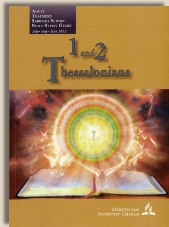|
||||||||||||||
Commentary on "The Apostolic Example (1 Thess. 2:112)"
Day 3: Monday, July 30, 2012 - The Character of the Apostles (1 Thess. 2:3)
Observations
The lesson starts by asking the reader to think on what key point Paul is making about motives. I hope that your answer is something along the lines of Paul's motives being pure and selfless.
I have to wonder why the lesson is relying on Greek philosophy ("It is widely known in the ancient world"). The principles of ethos, logos, and pathos are drawn from the Greek philosopher Aristotle. Shouldn't our doctrinal understanding be based on Scripture rather than Greek philosophy?
The lesson claims that verses 3-6 focus "on the character of the apostles as a key element of the preaching that led to radical changes in the Thessalonians". Let's examine how this compares to what Scripture says in these verses:
ESV "For our appeal does not spring from error or impurity or any attempt to deceive, but just as we have been approved by God to be entrusted with the gospel, so we speak, not to please man, but to please God who tests our hearts. For we never came with words of flattery, as you know, nor with a pretext for greed— God is witness. Nor did we seek glory from people, whether from you or from others, though we could have made demands as apostles of Christ."
There is nothing in these verses to indicate that is was the character of the apostles that led to radical changes. It was the preaching of the Gospel. Paul spoke that message plainly, not in a manner that would please men, not with flattery, and certainly not with deceit. I generally prefer translations that are as literal as possible, such as the ESV and NASB. Yet sometimes a dynamic translation, one based on trying to translate concept to concept rather than word for word, can be a useful addition. Look at how Phillips translates this passage, along with the following verses:
"Our message to you is true, our motives are pure, our conduct is absolutely above board. We speak under the solemn sense of being trusted by God with the Gospel. We do not aim to please men, but to please God who knows us through and through. No one could ever say, as again you know, that we used flattery to conceal greedy motives, and God himself is witness to our honesty. We made no attempt to win honour from men, either from you or from anybody else, though I suppose as Christ’s own messengers we might have done so. Our attitude among you was one of tenderness, rather like that of a devoted nurse among her babies. Because we loved you, it was a joy to us to give you not only the Gospel of God but our very hearts—so dear did you become to us. Our struggles and hard work, my brothers, must still be fresh in your minds. Day and night we worked so that our preaching of the Gospel to you might not cost you a penny. You are witnesses, as is God himself, that our life among you believers was honest, straightforward and above criticism. You will remember how we dealt with each one of you personally, like a father with his own children, stimulating your faith and courage and giving you instruction. Our only object was to help you to live lives worthy of the God who has called you to share the splendour of his kingdom. And so we are continually thankful that when you heard us preach the word of God you accepted it, not as a mere human message, but as it really is, God’s Word, a power in the lives of you who believe."
Again, there is nothing to even suggest that is was the character of the apostles that brought about the conversion. The message of the passage is that it was the clear and direct preaching of the Gospel that changed people. As we saw in the last lesson, this author has twisted and rewritten Scripture in order to insert the teaching that an upright and righteous character is a critical component of the Gospel. It is amazing to compare how Paul describes his own teaching, "For our appeal does not spring from error or impurity or any attempt to deceive" with the error and perhaps even deceit present in this week's lesson.
Let's step outside this lesson for just a moment and examine SDA evangelism tactics relative to Paul's evangelism efforts. SDA evangelism seminars often rely on deceiving people. They are often held in neutral locations. The leaders presenting refuse to answer that they are SDA when asked about what church they represent. And of course there is the infamous change in location due to an accidental double booking of the meeting hall or an unexpected shortfall of funds and the local SDA church just happens to be able to graciously offer the use of their church. Notice how different this is from how Paul acts in Thessalonica. Paul would have every reason to hide who he really was and what he was really teaching. He was being persecuted for his teaching.
Returning to the lesson, the author states that "The power that the gospel had in Thessalonica (see 1 Thess. 1:5) was in part due to the character of the apostles". This would give one the impression that 1 Thess 1:5 taught something about the importance of the character of the apostles. Yet the verse does say this at all:
ESV "because our gospel came to you not only in word, but also in power and in the Holy Spirit and with full conviction. You know what kind of men we proved to be among you for your sake."
The Holy Spirit, not the apostle's character, seemed to be a big issue. If it was anything about the apostles that gave the message of the Gospel power, it was from the signs seen through the gifts of the Holy Spirit among the apostles. What this lesson does, just like yesterday's lesson is to steal the power that the Gospel message itself has, and instead claim that this power came from the character of the apostles. The author accomplishes these claims through various sleights of hand, like citing a verse without quoting it, giving the casual reader the impression that the author's words have a biblical basis. This is a common trick (deception) of SDA Bible studies, be it Sabbath School lessons or evangelistic studies. Many times SDA have become so used to this approach that as long as the claim doesn't seem to disagree with their church teaching they don't even investigate the verse cited.
Copyright 2012 BibleStudiesForAdventists.com. All rights reserved. Revised July 24, 2012. This website is published by Life Assurance Ministries, Camp Verde, Arizona, USA, the publisher of Proclamation! Magazine. Contact email: BibleStudiesForAdventists@gmail.com.
The Sabbath School Bible Study Guide and the corresponding E.G. White Notes are published by Pacific Press Publishing Association, which is owned and operated by the Seventh-day Adventist church. The current quarter's editions are pictured above.
Official Adventist Resources
Standard Edition Study Guide Week 5
Teacher's Edition Study Guide Week 5
Easy Reading Edition Study Guide Wk 5
Search the Complete Published Ellen G. White Writings
Please Support This Project


